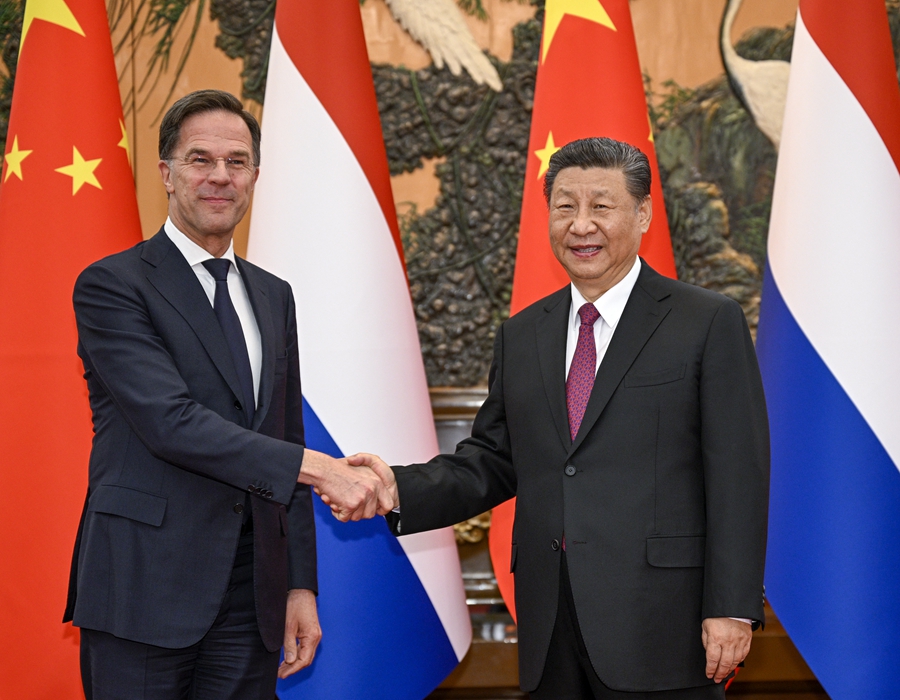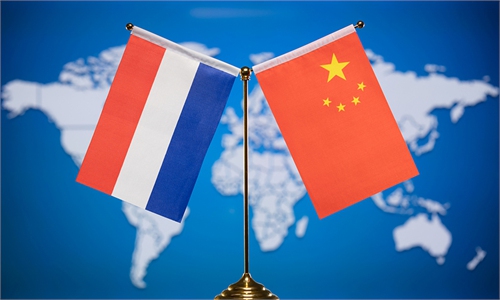
Chinese President Xi Jinping meets with Prime Minister of the Netherlands Mark Rutte, who is paying a working visit to China, at the Great Hall of the People in Beijing, capital of China, March 27, 2024. Photo: Xinhua
Chinese President Xi Jinping stressed economic globalization may encounter headwinds, but the historical trend will not change, during his Wednesday meeting with visiting Prime Minister of the Netherlands Mark Rutte, and reiterated China's commitment to mutual benefits and win-win approach.
Observers believe the high-level meeting and Rutte's two-day working visit from Tuesday can inject positive impetus into bilateral relations and stabilize the big picture amid challenges from the Dutch export ban on chip machines to China.
Against the backdrop of mounting pressure from the US and ASML's dilemma to run its business, the Dutch government should carefully balance the interests of different parties and remain pragmatic, analysts said, noting a country that flourished through free trade should not abandon such tradition.
Noting the Netherlands has become a veritable "gateway" for China-EU cooperation, Xi said China is ready to maintain exchanges at various levels with the Netherlands, adhere to communications and dialogue, and pursue mutual benefits and win-win results, according to the Xinhua News Agency.
There is no way out for "decoupling and de-risking," and open cooperation is the only choice, Xi said.
The Chinese people also have legitimate development rights, and no force can stop the pace of China's scientific and technological progress, said Xi, adding China will continue to pursue a win-win approach, open wider to the outside world at a high level, and share development dividends with all parties.
Rutte said that "decoupling" is not the policy option of Dutch government, as actions harming China's development interests will ultimately hurt the Netherlands.
Xi and Rutte last met on the sidelines of the G20 Summit in Bali in November 2022.
Dutch Trade and Development Minister Geoffrey van Leeuwen who is in the delegation said on Tuesday that defending the interests of ASML is his "number one" priority.
The high-level interaction between the two countries at this crucial juncture helps tackle kinks in the bilateral ties, stabilizing and injecting impetus into further development of the relationship, analysts said.
Zhao Junjie, a research fellow at the Institute of European Studies of the Chinese Academy of Social Sciences, told the Global Times on Wednesday that the Dutch government is walking a tightrope, as pressure from the US is mounting while ASML is demanding more support for its business.
The chip machine giant has threatened to leave the Netherlands, citing anti-migration policies. Observers believe export bans imposed under US pressure will also cast a shadow over the company's performance and add to the push.
Zhao pointed out that the bans not only harm the semiconductor giant and jeopardize China-Netherlands trade cooperation and economic ties, but also put a question mark on the country's business climate.
Despite the skirmish over chip machines, the two countries maintain pragmatic cooperation in many fields, including green and low-carbon economy, silver economy, and climate change response, analysts said.
China has granted Dutch citizens visa-free status for short trips since December 1, 2023 to facilitate personnel exchanges. Rutte on Wednesday also visited the prestigious Peking University and communicated with students.
During the Wednesday meeting, Xi urged the two sides to promote traditional cooperation in such fields as agriculture, water conservancy and energy, and tap the potential of cooperation in artificial intelligence, green transformation and silver economy, among others.
He also expressed the hope that the two countries will continue to take more measures to facilitate personnel exchanges and encourage educational, cultural and sub-national exchanges.

